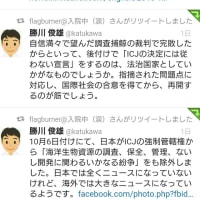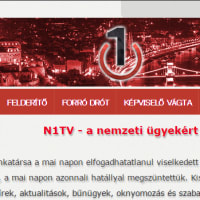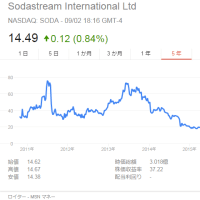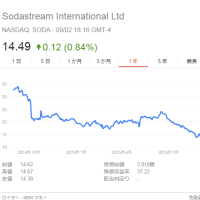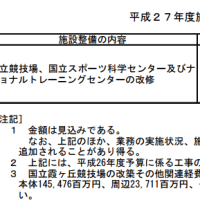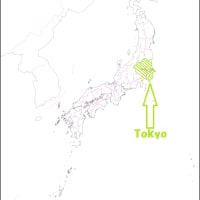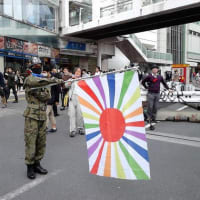何か知らんが、パレスチナ暫定政府(PA)が複数のニュースサイトへのアクセス制限(というか検閲)を行っていた模様。
・Palestinian media clampdown spreads to the Web(2012年4月23日 Ma'an News Agency)
先月は先月で、「PA の高官の名誉を傷つける記事を書いた」という理由でジャーナリストの Yousef al-Shayeb 氏が逮捕される、なんてこともあったけど。
これについては以下参照(手抜き)
・Detained Yousef al-Shayeb:messages to all Palestine journalists?(2012年4月1日 flagburner's blog(仮))
今回のケースでは、PA がパレスチナ・テレコム(Palestinian Telecommunications Company:PalTel)に対し、プロキシサーバで使っているソフト(Squid cache)の設定を変えて(少なくても)8つのニュースサイトへのアクセスを禁止するよう求めていたとか。
↓Open Observatory of Network Interference というサイトが公開していたアクセス禁止メッセージのの内訳。
・Hadara Palestine(2012年4月23日 ooni.nu)
で、PA が(少なくても)8つのニュースサイトへのアクセスを禁止した背景が、色々厄介なようで・・・。
以下、2012年4月23日分 Ma'an News Agency『Palestinian media clampdown~』からそれを述べてる部分を(略
---- 以下引用 ----
(中略)
Many of the sites have been described as loyal to Muhammad Dahlan, a former Fatah leader and critic of Abbas. A feud between them took on new urgency last summer, when Fatah sought to expel the former strongman and security forces raided his home.
As far back as June 2011, the Palestinian Authority was complaining about its inability to shut down alleged Dahlan media based abroad, the al-Hayat newspaper reported at the time.
Four of those sites are now being blocked.
Several Palestinian officials have expressed reservations about the decision, calling it embarrassing and counterproductive.
One of them, a member of Salam Fayyad's cabinet, agreed to speak on the record for this story.
Other officials who spoke to Ma’an in recent weeks were not authorized by the Palestinian Authority or PalTel to discuss either the blocking decision or the technology being used to enforce it.
Officials familiar with the order say it came from Ahmad al-Mughni, the Palestinian attorney general.
They say he delivered it in person to the CEO of at least one of the service providers being forced to prevent access.
Al-Mughni dismissed these claims and refused to take questions from Ma'an.
"I am not the court," he said Tuesday without elaborating.
(以下略)
---- 引用以上 ----
どこの誰が、(少なくても)8つのニュースサイトへのアクセス禁止を決めたのか不明だが・・・。
結果として、web 上の検閲について PA による政治的な意図があるのは否定できないかと。
だいたい、この手の通達(というか命令)を決めるのは PA の高官なわけだし。
で、この件について、PalTel は 2012年4月23日分の Ma'an News Agency の記事に返答する形で見解を示していた。
・Statement by Paltel Group in response to the article(略)(2012年4月25日 Ma'an News Agency)
以下、2012年4月25日分 Ma'an News Agency『Statement by Paltel Group~』を全文(略
---- 以下引用 ----
Statement by Paltel Group in response to the article “Clampdown on Palestinian media spreads to the Web” by George Hale published on Maan News English, April 23, 2012
Subject: Web censorship in the West Bank
Since its inception, Paltel has been conducting its activities and operations dealing with the Palestinian National Authority and its governmental bodies in compliance with the applicable laws and regulations and related official, regulatory and judicial orders that are issued by those entities.
Paltel Group has no choice except to abide by those official, judicial, regulatory and legal orders on the basis or allegations related to competent jurisdictions among those official bodies and entities.
Our role is to implement those orders and instructions and not to enter into such matters that the company cannot deal with or accept to be part of.
Ammar Aker
CEO
---- 引用以上 ----
「上からの命令なんで」って奴か。
まぁ、PalTel としても幹部逮捕→業務停止命令という展開は避けるしかないんだろうが・・・。
なお、、アラブ諸国で行われてるネット上の検閲については、実態を掴むのが(想像以上に)難しい模様。
・West Censoring East: The Use of Western Technologies by Middle East Censors, 2010-2011(2011年3月?日 opennet.net)
以下、2011年3月?日opennet.net『West Censoring East~』から『The mass use of commercial filters: Leave no traces』を(略
ただし、一部表記を修正しておいた。
---- 以下引用 ----
(中略)
The mass use of commercial filters: Leave no traces
ISPs using commercial filters are increasingly obscuring that fact.
A few years ago, blockpages and their corresponding html source code had references to the commercial filter being used.
We have since found that more ISPs have cleansed such references from the Web surfing experience.
For example, UAE ISP du’s blockpage source code had earlier in 2010 a hint as to the commercial filter.
The blockpage source code included the URL ttp://94.201.251.238/webadmin/start/, which is the link to the Netsweeper management interface.
Similarly, Qatar’s Qtel, had the same reference page on its own blockpage, ttp://82.148.98.52:8080/webadmin/deny/index.html.
Though Yemen’s YemenNet no longer shows in its blockpage the name of the commercial filter, our examination of the blockpage source code found a clue that enabled us to generate the Netsweeper management page installed in the local servers.
Moreover, some ISPs’ blockpages used to have the logo or the name of commercial filter they used.
Saudi Arabia’s Saudi Telecom’s blockpage in 2009 printed the name and logo of SmartFilter for some objectionable websites.
The Saudi authorities then announced a new standard blockpage after supervision of Internet filtering in the country was transferred from King Abdul Aziz City for Science and Technology (KACST) to the state Communications and Information Technology Commission (CITC).
The blockpage announced by the authorities had no reference as to what software the ISPs use.
Other countries such as Libya, Morocco, and Jordan also implement Internet censorship to various degrees, but we have not determined whether any of these countries use the software highlighted in this paper.
In Syria, we found that ISPs such as Inet, Teranet, and Zad have used Squid as a proxy tool to block access to objectionable websites that included oppositional Web content.
Squid is a free software package released under the GNU General Public License that was funded by the National Science Foundation.
It is a caching proxy that is built to reduce bandwidth and improve response times by caching and reusing frequently-requested Web pages, however, ISPs in Syria have repurposed it for Internet censorship.
It is important to note that due to the fact that some ISPs have switched commercial filters and now attempt to leave no indication of what commercial filters are being used, ONI can only verify that the commercial filtering solutions mentioned above have at one time been used by the respective ISPs.
(以下略)
---- 引用以上 ----
今後、PA が Web 上での検閲を行う際、シリアやサウジアラビアなどでの手法を真似する悪寒・・・。
・Palestinian media clampdown spreads to the Web(2012年4月23日 Ma'an News Agency)
先月は先月で、「PA の高官の名誉を傷つける記事を書いた」という理由でジャーナリストの Yousef al-Shayeb 氏が逮捕される、なんてこともあったけど。
これについては以下参照(手抜き)
・Detained Yousef al-Shayeb:messages to all Palestine journalists?(2012年4月1日 flagburner's blog(仮))
今回のケースでは、PA がパレスチナ・テレコム(Palestinian Telecommunications Company:PalTel)に対し、プロキシサーバで使っているソフト(Squid cache)の設定を変えて(少なくても)8つのニュースサイトへのアクセスを禁止するよう求めていたとか。
↓Open Observatory of Network Interference というサイトが公開していたアクセス禁止メッセージのの内訳。
・Hadara Palestine(2012年4月23日 ooni.nu)
で、PA が(少なくても)8つのニュースサイトへのアクセスを禁止した背景が、色々厄介なようで・・・。
以下、2012年4月23日分 Ma'an News Agency『Palestinian media clampdown~』からそれを述べてる部分を(略
---- 以下引用 ----
(中略)
Many of the sites have been described as loyal to Muhammad Dahlan, a former Fatah leader and critic of Abbas. A feud between them took on new urgency last summer, when Fatah sought to expel the former strongman and security forces raided his home.
As far back as June 2011, the Palestinian Authority was complaining about its inability to shut down alleged Dahlan media based abroad, the al-Hayat newspaper reported at the time.
Four of those sites are now being blocked.
Several Palestinian officials have expressed reservations about the decision, calling it embarrassing and counterproductive.
One of them, a member of Salam Fayyad's cabinet, agreed to speak on the record for this story.
Other officials who spoke to Ma’an in recent weeks were not authorized by the Palestinian Authority or PalTel to discuss either the blocking decision or the technology being used to enforce it.
Officials familiar with the order say it came from Ahmad al-Mughni, the Palestinian attorney general.
They say he delivered it in person to the CEO of at least one of the service providers being forced to prevent access.
Al-Mughni dismissed these claims and refused to take questions from Ma'an.
"I am not the court," he said Tuesday without elaborating.
(以下略)
---- 引用以上 ----
どこの誰が、(少なくても)8つのニュースサイトへのアクセス禁止を決めたのか不明だが・・・。
結果として、web 上の検閲について PA による政治的な意図があるのは否定できないかと。
だいたい、この手の通達(というか命令)を決めるのは PA の高官なわけだし。
で、この件について、PalTel は 2012年4月23日分の Ma'an News Agency の記事に返答する形で見解を示していた。
・Statement by Paltel Group in response to the article(略)(2012年4月25日 Ma'an News Agency)
以下、2012年4月25日分 Ma'an News Agency『Statement by Paltel Group~』を全文(略
---- 以下引用 ----
Statement by Paltel Group in response to the article “Clampdown on Palestinian media spreads to the Web” by George Hale published on Maan News English, April 23, 2012
Subject: Web censorship in the West Bank
Since its inception, Paltel has been conducting its activities and operations dealing with the Palestinian National Authority and its governmental bodies in compliance with the applicable laws and regulations and related official, regulatory and judicial orders that are issued by those entities.
Paltel Group has no choice except to abide by those official, judicial, regulatory and legal orders on the basis or allegations related to competent jurisdictions among those official bodies and entities.
Our role is to implement those orders and instructions and not to enter into such matters that the company cannot deal with or accept to be part of.
Ammar Aker
CEO
---- 引用以上 ----
「上からの命令なんで」って奴か。
まぁ、PalTel としても幹部逮捕→業務停止命令という展開は避けるしかないんだろうが・・・。
なお、、アラブ諸国で行われてるネット上の検閲については、実態を掴むのが(想像以上に)難しい模様。
・West Censoring East: The Use of Western Technologies by Middle East Censors, 2010-2011(2011年3月?日 opennet.net)
以下、2011年3月?日opennet.net『West Censoring East~』から『The mass use of commercial filters: Leave no traces』を(略
ただし、一部表記を修正しておいた。
---- 以下引用 ----
(中略)
The mass use of commercial filters: Leave no traces
ISPs using commercial filters are increasingly obscuring that fact.
A few years ago, blockpages and their corresponding html source code had references to the commercial filter being used.
We have since found that more ISPs have cleansed such references from the Web surfing experience.
For example, UAE ISP du’s blockpage source code had earlier in 2010 a hint as to the commercial filter.
The blockpage source code included the URL ttp://94.201.251.238/webadmin/start/, which is the link to the Netsweeper management interface.
Similarly, Qatar’s Qtel, had the same reference page on its own blockpage, ttp://82.148.98.52:8080/webadmin/deny/index.html.
Though Yemen’s YemenNet no longer shows in its blockpage the name of the commercial filter, our examination of the blockpage source code found a clue that enabled us to generate the Netsweeper management page installed in the local servers.
Moreover, some ISPs’ blockpages used to have the logo or the name of commercial filter they used.
Saudi Arabia’s Saudi Telecom’s blockpage in 2009 printed the name and logo of SmartFilter for some objectionable websites.
The Saudi authorities then announced a new standard blockpage after supervision of Internet filtering in the country was transferred from King Abdul Aziz City for Science and Technology (KACST) to the state Communications and Information Technology Commission (CITC).
The blockpage announced by the authorities had no reference as to what software the ISPs use.
Other countries such as Libya, Morocco, and Jordan also implement Internet censorship to various degrees, but we have not determined whether any of these countries use the software highlighted in this paper.
In Syria, we found that ISPs such as Inet, Teranet, and Zad have used Squid as a proxy tool to block access to objectionable websites that included oppositional Web content.
Squid is a free software package released under the GNU General Public License that was funded by the National Science Foundation.
It is a caching proxy that is built to reduce bandwidth and improve response times by caching and reusing frequently-requested Web pages, however, ISPs in Syria have repurposed it for Internet censorship.
It is important to note that due to the fact that some ISPs have switched commercial filters and now attempt to leave no indication of what commercial filters are being used, ONI can only verify that the commercial filtering solutions mentioned above have at one time been used by the respective ISPs.
(以下略)
---- 引用以上 ----
今後、PA が Web 上での検閲を行う際、シリアやサウジアラビアなどでの手法を真似する悪寒・・・。











